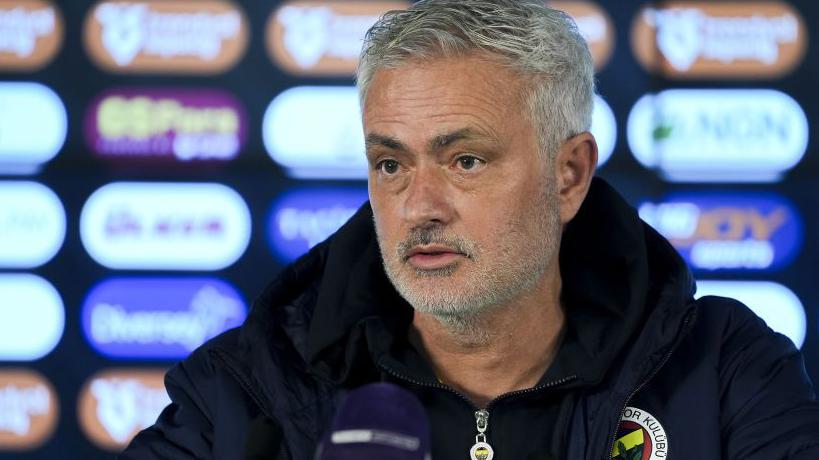The heated rivalry between Istanbul giants Galatasaray and Fenerbahçe reached new heights following their goalless draw in the Turkish Super Lig, with Galatasaray head coach Okan Buruk delivering a scathing response to José Mourinho’s complaints about match officials. The Portuguese tactician, known for his fiery temperament and strategic mind, had expressed dissatisfaction with certain refereeing decisions during the high-stakes encounter at the Atatürk奥林匹克 Stadium. However, Buruk wasted no time in dismissing Mourinho’s grievances, suggesting that the former Manchester United and Chelsea boss should focus more on improving his team’s performance rather than blaming external factors.
The match itself was a tense affair, characterized by intense physicality and tactical battles, but ultimately lacked the clinical edge needed to break the deadlock. Both teams created chances, with Galatasaray perhaps shading possession slightly, while Fenerbahçe relied on counterattacks spearheaded by their star striker Kenan Kırıkcı. Despite the lack of goals, the game carried significant implications for both clubs in their pursuit of domestic supremacy. As the final whistle blew, Mourinho approached the fourth official to voice his concerns, a move that did not go unnoticed by his counterpart on the opposing bench.
Okan Buruk, who has established himself as one of Turkey’s most outspoken managers, took exception to Mourinho’s public criticism of the officials. Speaking to reporters after the match, Buruk remarked, “If José wants to keep crying, let him cry all he wants. We played our game, we gave everything, and if they couldn’t convert their opportunities, that’s their problem. I don’t have time for these kinds of distractions.” His comments underscored the growing frustration among Turkish coaches with Mourinho’s tendency to shift blame onto referees when results do not favor his side.
Buruk’s reaction reflects broader sentiments within the Turkish football community regarding Mourinho’s managerial style. While few dispute his tactical acumen or achievements across Europe, some critics argue that his penchant for controversy often overshadows the quality of football being played. This particular incident reignited debates about whether Mourinho’s approach aligns well with the passionate yet respectful culture of Turkish football, where rivalries are fierce but traditionally conducted with mutual respect.
For Galatasaray, the stalemate maintained their position near the top of the league table, though it also highlighted areas requiring improvement ahead of crucial fixtures against European opponents. Buruk emphasized the importance of maintaining composure under pressure, stating, “We need to be smarter in situations like this. Yes, it’s derby day, emotions run high, but we must stay focused on what matters—our game plan and execution.” He praised his players’ resilience but acknowledged the need for greater efficiency in front of goal.
Fenerbahçe, meanwhile, remains locked in a tight battle for Champions League qualification spots. Mourinho’s post-match frustrations stemmed from specific incidents during the game, including a contentious penalty claim and several borderline fouls committed by Galatasaray defenders. The Portuguese manager argued that such decisions could significantly alter the outcome of tightly contested matches, especially in derbies where margins are razor-thin. “I’m not here to make excuses,” Mourinho told reporters, “but when you see clear mistakes affecting your team, it’s only natural to feel frustrated.”
This exchange between two prominent figures in modern football sheds light on differing philosophies regarding sportsmanship and accountability. Mourinho, a self-proclaimed “Special One,” has long championed the idea that managers must advocate fiercely for their teams, even if it means challenging authority figures. On the other hand, Buruk advocates for a more pragmatic approach, believing that success ultimately depends on preparation, execution, and adaptability rather than external influences.
Historically, the Istanbul derby carries immense significance beyond mere points in the standings. For supporters of both clubs, victories serve as badges of honor, while draws or defeats carry heavy emotional weight. In this context, Mourinho’s complaints might resonate differently depending on one’s perspective. Fans of Fenerbahçe may view his actions as justified given the stakes involved, whereas Galatasaray supporters could interpret them as an attempt to deflect attention from underlying issues within the squad.
Adding complexity to the situation is Mourinho’s track record of navigating turbulent waters throughout his career. From clashes with referees in England to disputes with club hierarchies in Italy and Spain, he has consistently courted controversy while delivering results. At Fenerbahçe, however, expectations remain exceptionally high due to the club’s rich history and ambitious targets. Failure to meet those benchmarks could amplify scrutiny surrounding Mourinho’s methods, particularly if his frequent criticisms alienate key stakeholders within Turkish football.
On the field, both teams demonstrated qualities worthy of contenders in the Turkish Super Lig. Galatasaray’s midfield duo of Ryan Babel and Filip Kostić provided creativity and control, while Fenerbahçe’s defense, anchored by experienced center-back Ozan Kabak, stood firm despite sustained pressure. These performances highlight the parity currently existing between Istanbul’s big two, making encounters like this all the more compelling.
Moving forward, both managers face challenges extending beyond individual matches or rivalries. For Buruk, consolidating Galatasaray’s resurgence requires nurturing young talents alongside seasoned professionals, ensuring balance between ambition and stability. Meanwhile, Mourinho must address lingering questions about Fenerbahçe’s attacking potency, which has occasionally faltered despite promising signs elsewhere.
Ultimately, the latest chapter in this storied rivalry serves as a reminder of football’s dual nature: a sport defined equally by passion and pragmatism. As Okan Buruk and José Mourinho continue shaping their respective teams, their interactions off the pitch promise to add further intrigue to an already fascinating season. Whether through words or deeds, each man seeks validation of his philosophy, knowing full well that success—or failure—will shape perceptions far beyond the confines of Istanbul.



